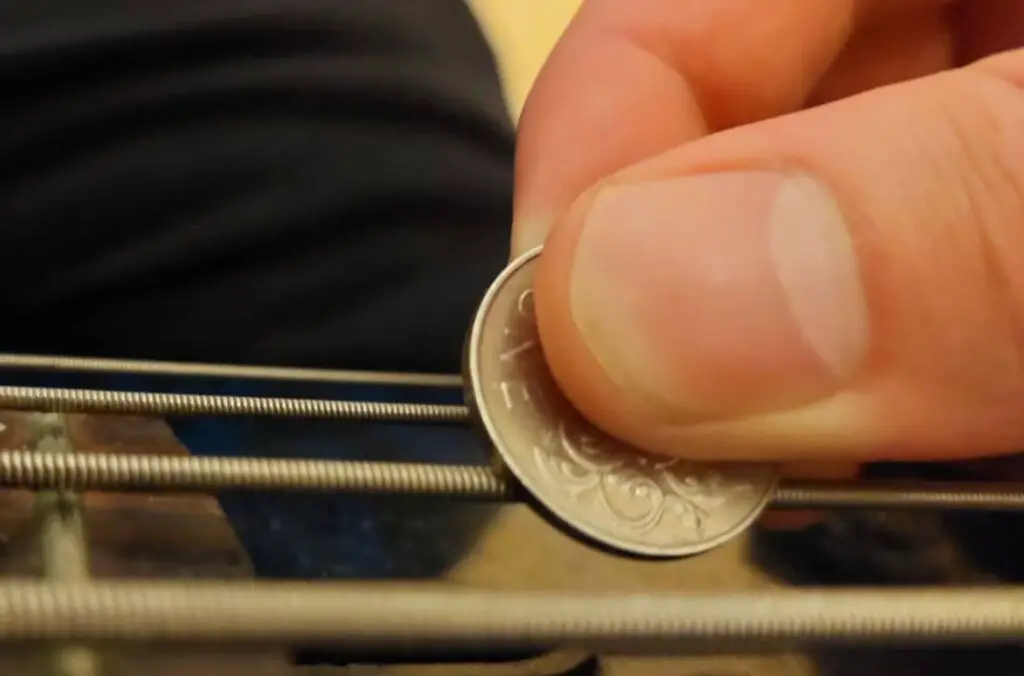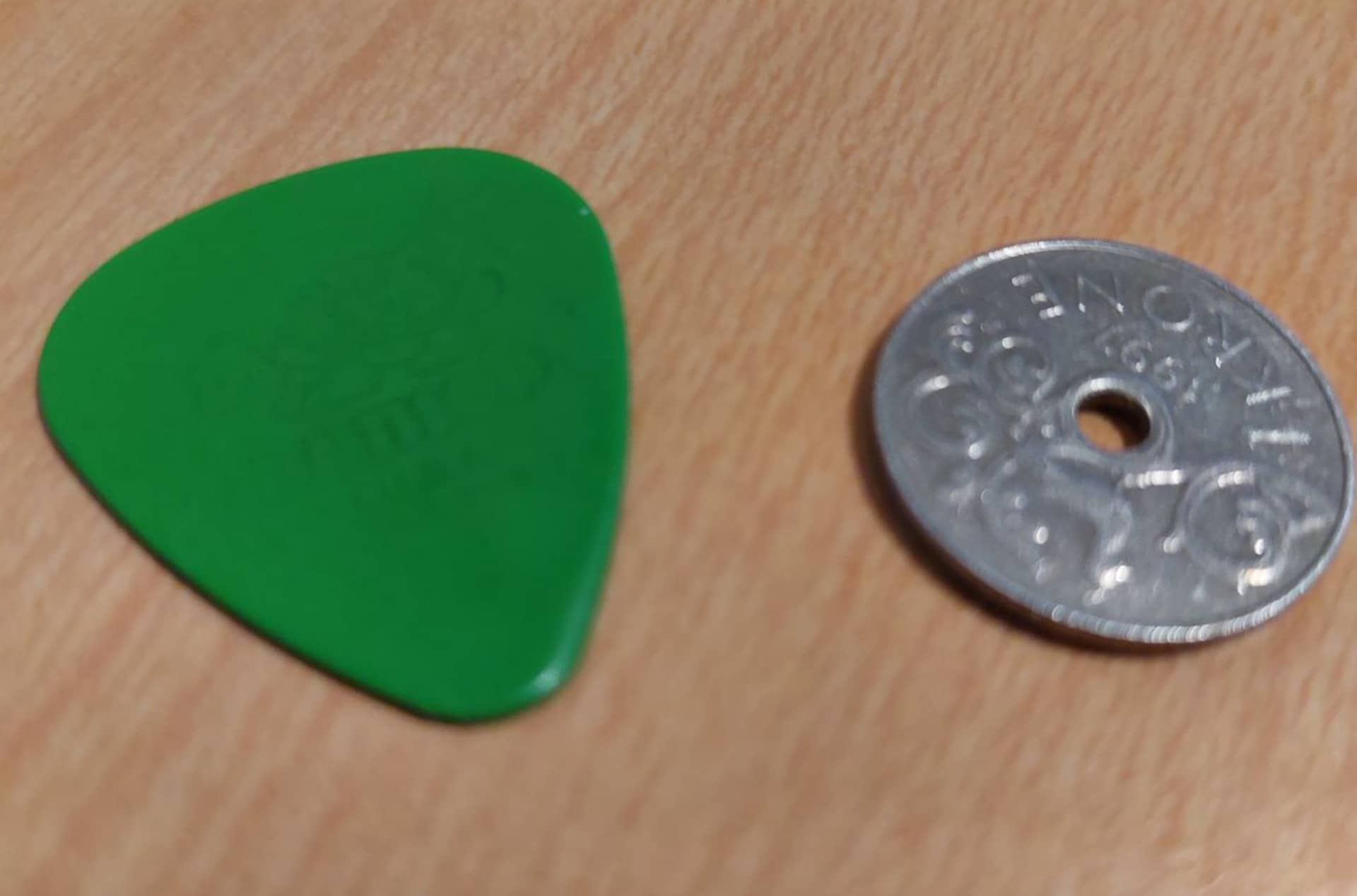Using a coin as a bass pick is a playstyle that many bassists are familiar with, but few utilize.
There are many ways to play the bass guitar, and an eternal debate over which is the best. The humble coin is rarely mentioned when bassists discuss whether fingerstyle or playing with a pick is superior.
But can you use a coin as a bass pick, and what does it sound like? I decided to give it a try, and I`m here to show you how it sounded, and what playing with a coin felt like.
I will also mention some musicians who have used a coin for picking. Lastly, I will show you what you need to be mindful of if you do decide to use a coin as a pick when playing the bass.
Can you use a coin as a bass pick?
It is possible to use a coin as a bass pick the same way you would use a regular plectrum. Coins produce a brighter and sharper tone than plastic plectrums. Due to their shape and size, switching from playing with a plectrum to a coin generally takes some adjusting.
Most bassists don’t use coins as their main plectrum. Still, it is a well-known trick for guitarists and bassists alike to put coins out on train tracks, in order to turn them into more suitable picks. Even Paul McCartney still does this to this day.
As for the sound, a coin produces a sharp, metallic, grunge-like tone.
Here is a bassline I played with a Norwegian 1kroner coin. It is effectively the same type of coin as a US nickel. Both are made from 75% copper and 25% nickel and share a diameter of 0.835″, or 21mm:
And here is the same line played with a 0.88 Dunlop bass pick for comparison. This has been my preferred pick for years., It`s available online if you want to try it for yourself.
Queen Guitarist Brian May uses a British Sixpence coin for picking, and there are other guitarists who have done the same. While coins are less common among bassists, they can be used to play the 4-string as well. However, there are some things you need to be mindful of if you decide to do so, as I will showcase below.
Is it bad to use a coin as a bass pick?
While a coin can be used to pick bass strings, coins smaller than a US half-a-dollar coin (1.2″/30.6mm) are noticeably smaller than regular bass picks. Coins will also wear down bass strings faster than regular plectrums.
The coin used in the audio example above was the size of a nickel. To me, it felt way too small. Playing simple lines felt seamless, but I struggled to control my picking when trying to play faster grooves.
The difference between bass and guitar picks is small when compared to the coin. While small guitar picks are not a good fit for all bassists, they can generally use them to some extent. The size of the coin would definitely make it feel close to unplayable to some.
The round shape of the coin also makes it feel less fluid when picking strings. While I could get used to this in time, I believe that it ultimately would have a negative impact on the speed, control, and fluidity of my picking hand.
Depending on your reasons for wanting to play with a coin, there might also be better options out there:
- Round pick – Are you considering playing with a coin due to its shape rather than its sound? As an alternative, consider a rounded bass pick instead, such as this 1.3mm from Dunlop
- Metal pick – If you are looking for a metallic sound but don`t like the playability of a coin, consider a metal pick instead. Generally, they are cheaper than plastic picks, especially when bought in a set such as this one.
Lastly, If you have a bass with pickups that are close to the strings, it will be hard to pick the strings right above the pickup with a coin. If you play right above the pickup, the coin will hit the pickup which produces an undesirable and clacky sound. I also expect the pickup to be worn out and damaged if you regularly hit it with a piece of metal.
You can easily solve this by not picking right above the pickups. However, this does put limits on what types of tones you have at your disposal.

Do coins damage bass strings?
Bass strings will be worn out faster by metal coins, than by plastic plectrums. The strings will not be immediately worn out by the metal-to-metal contact, but long-term use will require more frequent string changes.
You can try out a coin on your bass without causing noteworthy damage to your instrument. Regular Bass picks are thick, and bass strings are sturdy enough to handle them. It is only through regular and lasting use of a coin that your strings will see noticeably quicker wear.
It’s a good idea to change your bass strings at least every 6-12 months regardless. Thus, if you prefer using a coin for its playability, tone, or for the sheer image of it, the need for more frequent string changes shouldn’t stop you. Strings will be worn out no matter what, and doing so fast is in no way inherently bad.
What genre you are playing also has an effect on the war. If you were to use a coin consistently, this would become significantly more noticeable.
A slow-rock bassist would have to switch their strings out somewhat more often. A thrash metal bassist, on the other hand, would need to purchase new strings at painfully regular intervals if they played with a coin.
Conclusion
The coin opens up a new arsenal of tonal options. Regardless of whether you use it often, rarely, or never, having more options for how you can sound is always a good thing.
I recommend trying various coins if you do decide to give it a try. For most bassists, coins on the smaller side will feel too small. Holding a coin feels vastly different from holding a bass pick, and bigger coins will generally feel less awkward to play.
Be mindful of whether a coin produces a tone that suits the type of music you are playing. In any one band, it could elevate or ruin the overall sound of everyone. Thus, do not get married to the idea of playing with a coin, until you have seen how it works with other musicians.
With that said, if you like the tone and playability of it, a coin will give your bass playing and image a lot of character. As long as the need for more frequent string changes doesn’t deter you, and you can make the tone work in a band, I say go for it.
Some claim that the bass should be played with your fingers, not with a pick. To learn more about whether playing with a pick is actually bad, read my article on the subject here.

